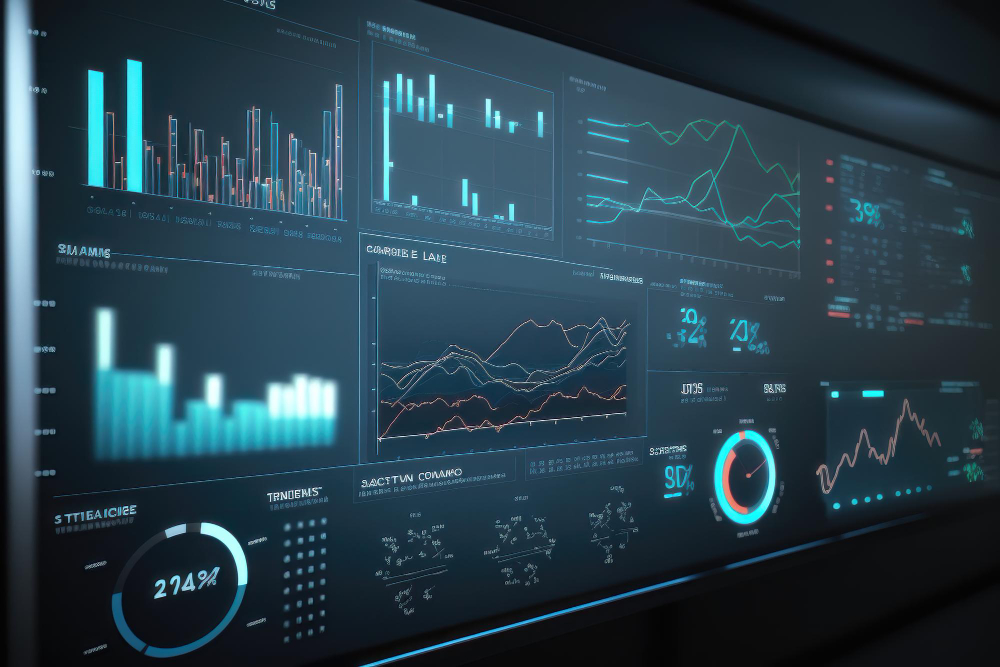Artificial Intelligence (AI) has emerged as a transformative force across various industries, and digital marketing is no exception. With the exponential growth of data and the increasing need for automation, AI has become an indispensable tool for marketers to analyze vast amounts of information, optimize campaigns, personalize user experiences, and drive business growth. In this […]
The Role of Artificial Intelligence in Digital Marketing: Leveraging AI for Data Analysis and Automation

Artificial Intelligence (AI) has emerged as a transformative force across various industries, and digital marketing is no exception. With the exponential growth of data and the increasing need for automation, AI has become an indispensable tool for marketers to analyze vast amounts of information, optimize campaigns, personalize user experiences, and drive business growth. In this article, we will explore the role of AI in digital marketing, delve into the latest trends and statistics, and highlight real-world use cases that demonstrate the power of leveraging AI for data analysis and automation.
The Power of AI in Data Analysis
Data is the lifeblood of digital marketing, providing valuable insights that can shape effective marketing strategies. However, the sheer volume and complexity of data make it challenging for marketers to extract meaningful information and make data-driven decisions. This is where AI comes into play.
Automated Data Processing
AI-powered algorithms can quickly process and analyze vast amounts of structured and unstructured data, enabling marketers to gain deeper insights and identify patterns that may have otherwise gone unnoticed. Tools such as Google Analytics, IBM Watson Analytics, or Tableau leverage AI to provide marketers with comprehensive reports and actionable recommendations.
Predictive Analytics
AI algorithms can utilize historical data to predict future outcomes and trends. By leveraging machine learning models, marketers can forecast customer behavior, optimize advertising campaigns, and allocate resources more efficiently. Tools like RapidMiner, SAS Predictive Analytics, and Microsoft Azure Machine Learning enable marketers to harness the power of predictive analytics and to make informed decisions, and stay ahead of their competition.
Sentiment Analysis
Understanding customer sentiment is crucial for developing effective marketing campaigns. AI-based sentiment analysis techniques can automatically analyze customer feedback, reviews, and social media posts to gauge public opinion. As example, Brandwatch, Lexalytics, and Social Mention use AI algorithms to perform sentiment analysis and provide actionable insights. Marketers can use these insights to tailor their messaging, improve brand reputation, and address customer concerns proactively.

Personalization and Customer Experience
In today’s digital landscape, customers expect personalized experiences tailored to their preferences. AI-driven technologies play a vital role in meeting these expectations, providing marketers with the means to deliver highly targeted and relevant content to individual users.
Recommendation Systems
AI-powered recommendation systems analyze user behavior, preferences, and historical data to suggest personalized products, content, and offers. Amazon’s recommendation engine, Netflix’s recommendation algorithm, and Spotify’s Discover Weekly playlist are prime examples of how AI-driven recommendation systems enhance user engagement and drive conversions. By employing collaborative filtering, content-based filtering, or hybrid approaches, marketers can increase user engagement, drive conversions, and foster long-term customer loyalty.
Chatbots and Virtual Assistants
Chatbots and virtual assistants powered by AI offer real-time customer support, enhancing the overall customer experience. Tools such as Chatfuel, IBM Watson Assistant, and ManyChat enable businesses to deploy AI-driven chatbots that can provide instant responses, answer frequently asked questions, and guide users through their journey. By automating routine tasks, businesses can improve efficiency and free up resources for more complex customer interactions.

Automation and Efficiency
AI-driven automation has the potential to revolutionize digital marketing by streamlining processes, reducing manual work, and improving overall efficiency.
Programmatic Advertising
Programmatic advertising leverages AI algorithms to automate the buying and selling of digital ads in real time. Platforms like Google Ads, The Trade Desk, and Adobe Advertising Cloud employ AI to optimize ad placements, target specific audience segments, and maximize ROI, enabling marketers to reach the right audience at the right time, delivering personalized messages across various channels.
Content Generation
AI-powered content generation tools can automate the creation of blog posts, social media updates, and product descriptions. Natural Language Processing (NLP) algorithms enable these tools to generate human-like content, saving time and resources for marketers. However, it is important to strike a balance between automation and maintaining an authentic brand voice. Examples of AI content generation tools include OpenAI’s GPT-3, Copysmith, and Articoolo.
Latest Trends and Statistics
To further emphasize the growing significance of AI in digital marketing, let’s explore some of the latest trends and statistics:
Voice Search Optimization: With the rising popularity of voice assistants such as Siri and Alexa, optimizing content for voice search has become crucial. By 2024, it is estimated that 50% of all searches will be voice-based. Tools like SEMRush, Moz, and AnswerThePublic help marketers identify voice search trends and optimize their content accordingly.
Hyper-Personalization: According to a study by Gartner, by 2025, 90% of brands will practice some form of personalization in their marketing strategies. AI is instrumental in delivering hyper-personalized experiences by analyzing customer data and generating tailored recommendations. Examples include Optimizely, Dynamic Yield, and Evergage.
Customer Lifetime Value (CLV) Prediction: By leveraging AI and machine learning models, marketers can predict the CLV of individual customers. Tools like Salesforce Einstein Analytics, Retention Science, and Zaius provide CLV prediction capabilities, enabling marketers to implement personalized retention strategies effectively.
Image and Video Recognition: AI-powered image and video recognition technologies are becoming increasingly accurate. Tools like Google Cloud Vision API, Amazon Rekognition, and Microsoft Azure Cognitive Services enable marketers to extract valuable insights from visual content, analyze user-generated content, and monitor brand mentions across social media platforms.

Real-World Use Cases
Netflix: Netflix’s recommendation engine is a prime example of AI in action. By analyzing user viewing habits, ratings, and engagement patterns, Netflix suggests personalized content to its subscribers, enhancing user satisfaction and driving engagement.
Spotify: Spotify uses AI algorithms to curate personalized playlists for its users based on their listening history, preferences, and behavior. This has significantly contributed to user retention and satisfaction.
Coca-Cola: Coca-Cola employed AI-powered sentiment analysis to gather real-time feedback during its “Share a Coke” campaign. By analyzing social media conversations, Coca-Cola gained insights into customer sentiments and adjusted its marketing strategy accordingly.
Conclusion
Artificial Intelligence has transformed digital marketing, revolutionizing the way marketers analyze data, personalize experiences, and automate processes. The latest trends and statistics highlight the increasing importance of AI in driving marketing strategies and delivering exceptional customer experiences. As AI continues to evolve, marketers must embrace its capabilities, adapt to new technologies, and leverage its power to gain a competitive edge in the dynamic digital landscape. By harnessing AI for data analysis and automation, businesses can unlock new opportunities for growth and success.
